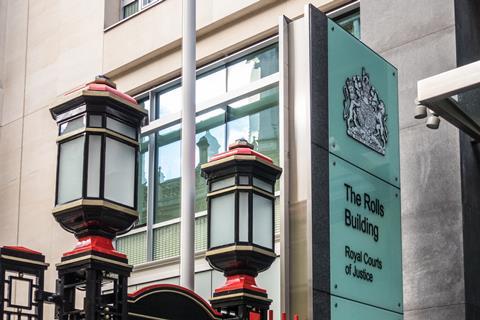A High Court judge has disallowed a costs budget which appeared to have been copied from the other side.
Master Brightwell, sitting in Hunt v Oceania Capital Reserves Ltd & Ors, said the explanations put forward by IPS Law and its partner Christopher Farnell were of the ‘dog ate my homework’ variety and he refused any relief from sanctions.
IPS Law and Farnell, defendants in a breach of trust claim over an investment agreement, had been required to file a costs budget by 4.30pm on 4 February. The claimant’s budget was filed that day at 3pm and the defendants’ came in at 5pm.
Brightwell said a half-hour delay would not have been a serious problem, but the bigger issue was that the front page of the IPS and Farnell budget did not match up with any figures in the rest of the document. Instead, these front page figures bore a ‘striking similarity’ with those submitted by the claimant.
The claimant’s costs for the issue phase had been estimated at £58,040. On page two of their budget, IPS and Farnell had claimed to have incurred costs of £30,000. But the front page stated that costs for this phase were £58,045. Further similarities were evident across various other elements of each budget.
Alec McCluskey, representing the claimant, said the defendants’ budget was on its face ‘incoherent’ and appeared to show that in the time between the two budgets being served, someone had reviewed the claimant’s budget and altered the defendants’ to closely match it.

Brightwell said the suspicion was inferred ‘entirely reasonably’ that IPS and Farnell adapted an old budget without any consideration whether it was appropriate, and/or added in figures from the claimant’s budget which had been served earlier.
‘When one looks at the subsequent pages of the [defendants’] budget it can be seen that the figures do not match the front page at all,’ said the master.
‘It is clear that a human mind made a decision to include three unnamed contingencies in the second and third defendants’ budget and to insert figures very close to those provided in the claimant’s budget, yet no explanation is made of that by Mr Farnell.’
Given the opportunity to apply for relief, Farnell explained that IPS was a small firm specialising in sports law (its website states that Farnell has represented Cristiano Ronaldo, Tyson Fury and Swansea City Football Club). Farnell had been absent from the office during the week prior to the budget deadline and had been assisted by a paralegal with the firm.
He explained that the firm had experienced two ‘critical technical failures’ that prevented timely compliance. A laptop had to be replaced and he had been unable to amend or read documents or use any software on documents. Farnell acknowledged that characters were inserted into the budget which should not have been there, and this would have been ‘extremely frustrating for the court and entirely confusing’.
Brightwell said the ‘gobbledegook’ in Farnell’s witness statement did not begin to explain how the figures in the budget nearly matched those in the claimant’s budget, adding: ‘It would be inherently incredible to suggest that a software glitch could have achieved this without any human intervention.’
He concluded: ‘I find in the absence of any attempt at explanation, that somebody deliberately inflated the figures on the front page to match those in the claimant’s budget.’
Granting relief, he continued, would be a ‘wholly unsatisfactory response’ to the breach which had occurred and would undermine the administration of justice. The application for relief was dismissed.’


























